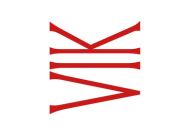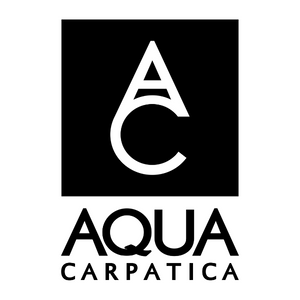This is not how I imagine Cyprus, an island country in the eastern Mediterranean Sea.
Winemaker Marcos Zambartas is in the cellar, making the most of this quieter period by creating his blends and preparing new wines for bottling under the family name. The hospitality team is having a short break, and the office staff are catching up with paperwork.
Viticulturalist Christodoulos Karaolis and his team are pruning the vines for balance – the stronger and older vines with long roots can support more shoots and still produce high quality grapes. The younger vines are left with just a few buds.
The shoots that are cut off are collected and used in two main ways. Some are placed in a nursery to grow roots and are then planted in new vineyards without grafting to American rootstock. The rest of the prunings are shred into small pieces and spread throughout the Zambartas family’s 13ha of vineyards.
“This increases the organic material in vineyards and feeds the vines with valuable nutrients that it needs,” Marco explains. “These small pieces of canes also provide microorganisms (useful fungi and bacteria) in the vineyard.
“A healthy vineyard is the base of a good and balanced wine.”
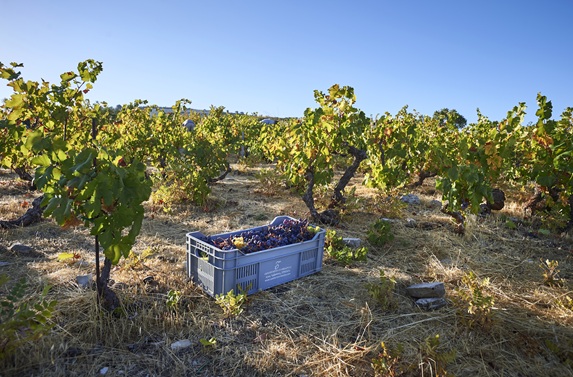
Second-generation winemaker Marcos, who took over the family business when his father Akis Zambartas died, is converting all their vineyards (7ha owned and 6ha rented) to organic. The process began in 2016, leading to the official certification of the Xynisteri vineyard in Mandria, from which they produce the Zambartas Xynisteri Single Vineyard, and the Margelina vineyard (above) in Agios Nikolaos, which received official organic certification in 2019.
“Turning from conventional to organic viticulture takes a lot of effort and is a long road,” Marcos reflects. “However, we strongly believe in the philosophy of organic practices and its benefits for both human health and nature.”
Marcos adds: “Nature is under great pressure when applying conventional high-impact agriculture. Using chemicals to spray and fertilise and endless ploughing bring a complete imbalance in the soil and biodiversity. Plants naturally flourish in a diverse natural surrounding where the different flora and fauna keep each other in balance. Once you strip a vineyard from this environment, you need increased, unnatural fertilisation to keep the vineyard productive. So, with organic viticulture, you go back to creating an environment where nature self-regulates with the helping hand of the viticulturalist.”
Christodoulos outlines some of the challenges of organic viticulture: “It is definitely an approach that needs more manpower! We do more frequent monitoring of the vines’ health, since we spray less and only with non-toxic and organically approved substances. The monitoring requires careful planning and a lot of time between the vines. Despite the time spent, it is still more difficult to fight disease. So, there is greater risk for losing a vineyard’s harvest due to a disease that year.”
What positive changes have you seen in the vineyard?
Christodoulos: “The vines are definitely healthier as the soil becomes richer. There is revived biodiversity of native flora and fauna, which is great to see. As we only plough once a year and let cover crops grow, in springtime the vineyard turns into a beautiful palette of colours. We have seen native orchids and other flowers, herbs and an increased population of bees and other insects.”
Marcos: “I would add that we do see increased flavour of the grapes, which, from an oenological point of view, is the ultimate outcome.”
Why Zambartas Winery’s efforts matter
The work being done by Zambartas Winery is integral to the ongoing efforts to elevate the reputation of Cyprus wine on the global stage. By focusing on quality, innovation, and sustainability, the winery is helping to reshape perceptions of Cypriot wines and demonstrate that the island is home to high-quality wines.The Zambartas approach to winemaking
As well as its commitment to organic viticulture, Zambartas is also committed to preserving the island’s indigenous grape varieties.After studying chemistry and oenology in France in the 1970s, Marcos’ late father, Akis, returned to Cyprus as the first university educated oenologist of the island. In the 1980s he began researching, recording and identifying 12 lost Cypriot grape varieties.
Five of these had the potential “to craft elegant and quality wines”, according to Akis. These were: Lefkada, Maratheftiko, Yiannoudi, Promara and Morokanella. Many of these were widely spread at the beginning of the 300-year Ottoman occupation but soon fell into decline due to the heavy taxation imposed on them.
Zambartas currently cultivates five Cypriot varieties; Mavro, Xynisteri, Promara, Maratheftiko and Yiannoudi.
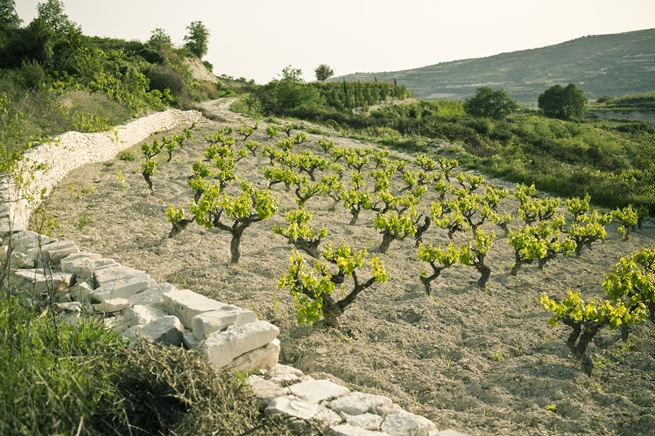
Zambartas makes Xynisteri, the most common white variety on the island, in three styles:
- Fresh in stainless steel – low-yielding old vines grown at 850m altitude in the Krasochoria region produce a popular wine with crisp acidity and aromas of citrus and stone fruits.
- Zambartas Single Vineyard Xynisteri from the organic certified Mandria Vineyard (900m asl, pictured above). Fermented in oak (French with American heads) with native yeasts and aged sur-lie for six months for a more complex wine with floral, citrussy and sweet spice notes.
- A sweet wine from sundried grapes. Zambartas’ Commandaria is produced from Xynisteri grapes sundried for two weeks before fermentation in tanks with native yeasts. The wine then matures for 10 years in used oak barrels.
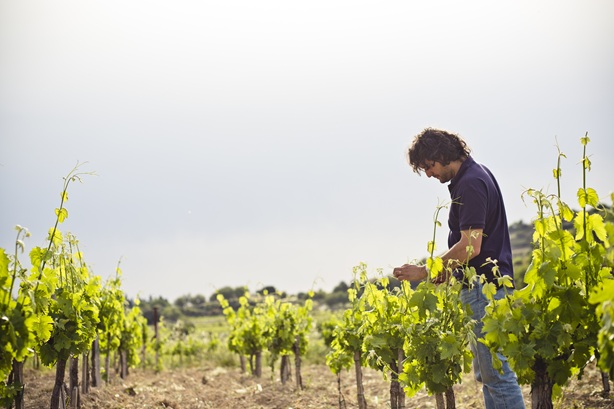
The main red is Maratheftiko (above), which is low-yielding and difficult to pollinate, but does produce complex, deeply coloured and round red wines with aromas of dark berries, cherry and violets, and hints of herbal notes and sweet spice from barrel ageing.
Akis described the variety this way:
- “It is difficult to grow and unpredictable. It has to be planted with another variety that flowers at the same time, because Maratheftiko is not able to self-pollinate... After long experiments we found the variety to use for the pollination: our own Spourtiko.
- “Maratheftiko is without doubt the best variety of Cyprus. It has its own character and despite its problem being a female variety that does not self-pollinate, it is recognised as a wine with great potential... Maratheftiko, when harvested and vinified correctly, gives rich intense red wines, with soft tannins and characteristic aromas of coffee, cacao that blend harmoniously with the vanilla aromas from the oak during careful ageing.”
“We expect the effect of the drought and heat to have less impact as we move on to varietals that ripen later in the season, especially the Cypriot varieties, which are more drought resistant than the French varieties. With climatic conditions likely to continue to get dryer and hotter, we need to adapt and cultivate even more local varieties higher up in the mountains.”
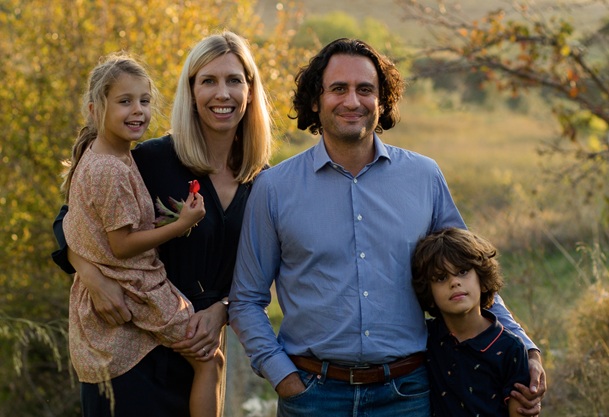
Marcos currently runs the winery, which his father established in the Limassol district in 2006, with his Dutch wife Marleen. They don’t just want to preserve the indigenous varieties; they want to elevate them. Hence the organic viticulture and the mix of modern and traditional winemaking techniques. But this combination has its challenges.
Marcos says: “In winemaking the approach for our organic wines is of minimal intervention, which means using native yeasts and applying less fining substances for clarity. So, in the cellar there is increased risk of spoilage because the native yeast is allowed to ferment, and less oenological substances are available to adjust the wine if something goes wrong down the track. As our current organic wines are single-vineyard wines, there is no chance of blending even to attain yearly consistency – it is one shot only!”
However, the combination of modern practices (including screwcaps) and traditional Cypriot grape varieties appears to be working. Zambartas Winery is producing about 100,000 bottles a year – wines that are gradually winning fans in international markets because of their high quality and distinctiveness.
Sustainable practices
Sustainability is another cornerstone of Zambartas Winery’s philosophy. The winery employs environmentally friendly practices across its operations. As well as the organic viticulture and minimal intervention in the winemaking process, they are committed to water saving and energy efficiency.Christodoulos outlines some of the sustainable practices: “We apply an approach of minimum water use, which is very important in a dry island like Cyprus. Water is scarce and will probably become scarcer in the future. Luckily vines are incredibly strong with long roots, so dry-farming is possible. Besides that, we leave the cover crops for increased biodiversity and make an effort to restore old traditional stonewalls. The stonewalls are an ideal hideaway for larger reptiles, as the stones reflect heat from the sun in cold days and the spaces between the stones provide shade in hot days.”
Marcos, who studied chemistry in London and got a master’s degree in oenology in Australia, adds: “We also generate a large chunk of our winery’s electricity from photovoltaics and have smart winery insulation. We avoid unnecessary packaging. Also, we are happy that we sell a considerable amount of wines from the winery, so there is lower carbon output for transportation.”
It may be cold and wet – but this is a glimpse into the future of Cyprus wine. It’s a future that combines tradition with modernity, sustainability with innovation, and local pride with global recognition. As the Zambartas Winery continues to progress, it is playing a central role in the broader movement to put Cyprus on the map as a respected wine region.

 English
English French
French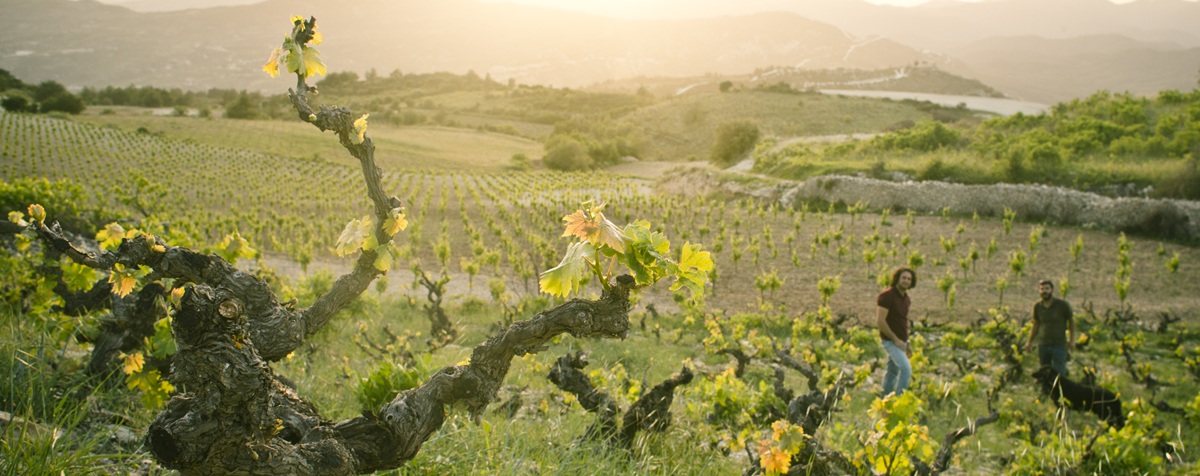



.png)
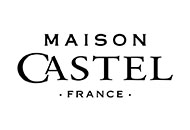

.png)

